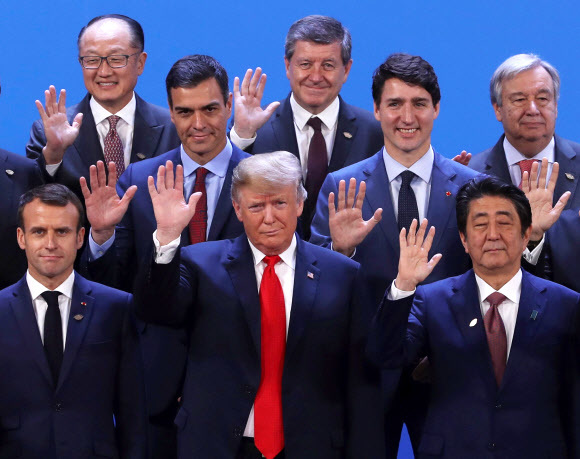 |
|
US President Donald Trump poses for a commemorative photograph with the leaders of 20 countries during the G20 Summit in Buenos Aires, Argentina, on Nov. 30. (EPA)
|
US and China leaders agree to ceasefire in trade war
US President Donald Trump said that Chinese President Xi Jinping promised to work with him “100 percent” on the issue of North Korea. This appears to mean that China and the US have restored cooperation, or at least communication, on the North Korean nuclear issue, which had taken a back seat to their trade dispute. Trump explained the results of his summit with Xi while speaking to reporters aboard Air Force One on the evening of Dec. 1 while returning home from the G20 summit held in Argentina. “We’ve agreed that we will work very strongly on North Korea. I have a very good relationship with Kim Jong Un,” Trump said. “Don’t forget, we’ve been doing that for what — six, seven months? Not a long time. People have been working on [the nuclear issue for] 20 years.” “[Xi] is agreeing to work with me 100 percent on North Korea,” Trump said. He described this as being “a big thing,” just like the trade negotiations. This means that Xi and Trump agreed not only to hold a “90-day ceasefire” in their trade war but also to strengthen cooperation on policy toward the North. Kim Han-kwon, a professor at the Korean National Diplomatic Academy, said that Trump’s remarks “appear to be an attempt to keep the sanctions tight while helping China save face.” When North Korea-US dialogue stalled, Trump expressed his dissatisfaction by putting the blame on China. Trump has also insisted that his campaign of “maximum pressure” would be neutralized if China withdraws from the sanctions and has slapped sanctions on Chinese companies that are implicated in ship-to-ship transfers with North Korea. Along with confirming his cooperation on maintaining sanctions, Xi may also have explored talks about easing those sanctions. While discussing the outcome of the China-US summit, Chinese Foreign Minister Wang Yi said, “We hope that both North Korea and the US will move together toward achieving the complete denuclearization of the Korean Peninsula and building a peace regime there while being considerate of each other’s reasonable concerns.” These remarks represent an appeal not to rely solely on sanctions. “Although China has agreed to work with the US on sanctions on North Korea for now, in the future it will continue to cooperate with North Korea and Russia on easing those sanctions while negotiating with the US in regard to the timing and conditions for doing so,” said Kim Han-kwon. Considering that the North Korea-US high-level talks have yet to be held as the second summit, which is supposed to be held in January or February of next year, draws near, Trump appears to have asked China for its help in prompting North Korea to take action. When reporters asked Trump if he could talk about the location of the second summit, he said, “within plane distance.” That could be a throwaway remark, but it may also mean that the US plans to accommodate Kim’s travel needs. In that case, Asian countries with a North Korean embassy, including Indonesia, Vietnam and Mongolia, would be on the list of options. Trump has said that the second summit won’t be held in Singapore, the site of the first summit, or in the US, though he said that would be possible someday. North Korea is reportedly opposed to sites in Europe, such as Sweden or Switzerland, because of the issue of transportation. Trump said that the second summit is likely to take place in January or February and that three sites are being considered for the location. By Hwang Joon-bum, Washington correspondent, and Park Min-hee, staff reporter Please direct comments or questions to [english@hani.co.kr]






